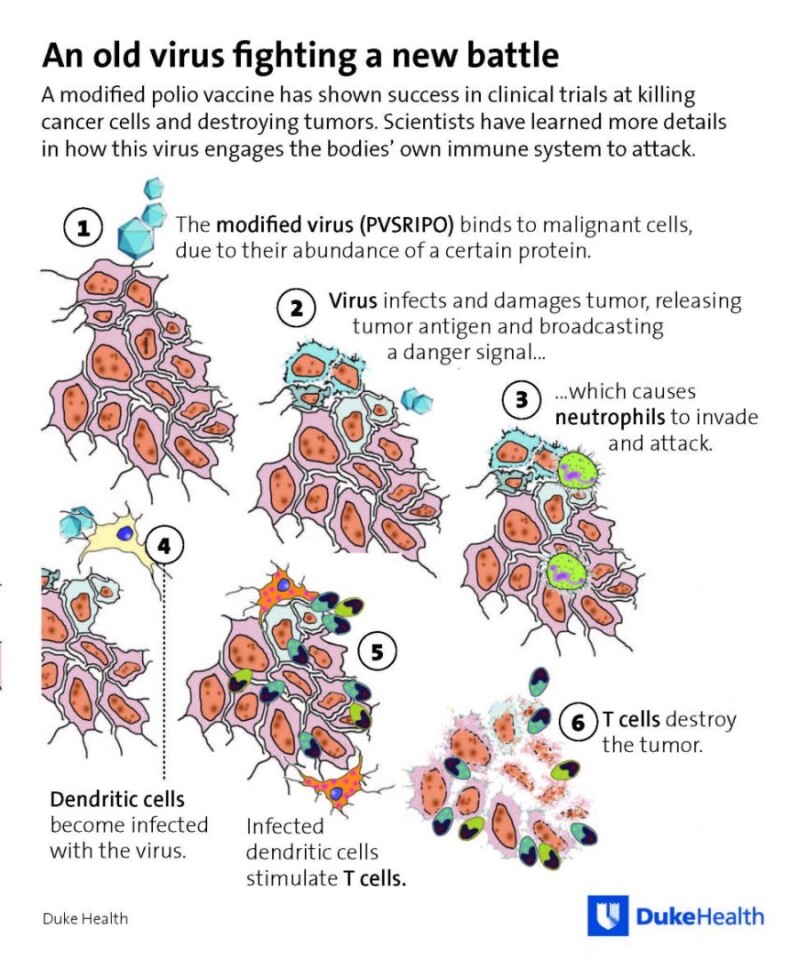A technique developed several years ago at Duke University involving an engineered hybrid of poliovirus and rhinovirus has shown great promise in treating a lethal form of brain cancer. A new study released by the team has described in detail how this modified virus both attacks tumor cells and triggers the body's immune system to do the same, suggesting it could also prove effective against other cancers.
Research into recruiting viruses to become cancer-killing agents is booming at the moment after recent genetic advances allowed scientists to effectively engineer custom viruses. Recently, a team discovered the Zika virus' remarkable ability to target and kill glioblastomas, a form of brain cancer.
The team at Duke University has pioneered development of a custom cancer-killing virus, engineered as a hybrid of poliovirus and rhinovirus.
Back in 2014, researchers at Duke University published a breakthrough study showing how a custom cancer-killing virus, called PVSRIPO, exhibits excitingly effective results in killing cancer cells. This chimeric virus, engineered as a hybrid of poliovirus and rhinovirus, was also shown to stimulate the immune system in attacking tumors, thereby suppressing the cancer's nasty habit of remission.
Last year, the FDA designated PVSRIPO as a "breakthrough therapy." This designation, based on early clinical trial success, is designed to accelerate a treatment's progress through the often time-consuming and laborious multi-phase clinical approval process.
A new study published by the researchers has, for the first time, elucidated how the treatment works on a detailed level.
"We have had a general understanding of how the modified poliovirus works, but not the mechanistic details at this level," says Matthias Gromeier, the study's co-senior author. "This is hugely important to us. Knowing the steps that occur to generate an immune response will enable us to rationally decide whether and what other therapies make sense in combination with poliovirus to improve patient survival."

The modified virus begins its attack by tracking down a protein called CD155, which has been found in abundance on tumor cells. In this stage of the attack the virus kills some, but not all, tumor cells. The virus also infects antigen-presenting cells, including dendritic cells and macrophages. It is this action that stimulates the body's immune system to attack, with cancer-killing T-cells launching to knock out the poliovirus-infected tumor.
"Not only is poliovirus killing tumor cells, it is also infecting the antigen-presenting cells, which allows them to function in such a way that they can now raise a T-cell response that can recognize and infiltrate a tumor," says Smita Nair, co-senior author on the study with Grimier. "This is an encouraging finding, because it means the poliovirus stimulates an innate inflammatory response."
While these initial studies are focusing on gliomas, a common type of brain tumor, the technique should be transferrable to several other cancers across the human body as the CD155 protein is a common marker across many cancer types.
"Because PVSRIPO naturally targets and destroys cancer cells from most common cancer types (pancreas, prostate, lung, colon, and many others), it can be directed against these cancers as well," says Gromeier. "To establish this in the clinic, we plan future clinical trials in patients with cancers other than brain tumors."
The team is continuing clinical trials examining the efficacy of the treatment and undertaking further study looking into how the immune system responds to the engineered virus.
The new study was published in the journal Science Translational Medicine.
Source: Duke University





